- Home
- John Irving
A Widow for One Year Page 2
A Widow for One Year Read online
Page 2
Eddie had heard of the tragedy in the Cole family, but—as with most teenagers—his attention to adult conversation was sporadic. He’d completed his second year at Phillips Exeter Academy, where his father taught English; it was an Exeter connection that got Eddie the job. Eddie’s father ebulliently believed in Exeter connections. First a graduate of the academy and then a faculty member, the senior O’Hare never took a vacation without his well-thumbed copy of the Exeter Directory. In his view, the alumni of the academy were the standard-bearers of an ongoing responsibility—Exonians trusted one another, and they did favors for one another when they could.
In the view of the academy, the Coles had already been generous to Exeter. Their doomed sons were successful and popular students at the school when they died; despite their grief, or probably because of it, Ted and Marion Cole had funded an annual visiting lecturer in English literature—Thomas and Timothy’s best subject. “Minty” O’Hare, as the senior O’Hare was known to countless Exeter students, was addicted to breath mints, which he lovingly sucked while reading aloud in class; he was inordinately fond of reciting his favorite passages from the books he’d assigned. The so-called Thomas and Timothy Cole Lectures had been Minty O’Hare’s idea.
And when Eddie had expressed to his father that his first choice for a summer job would be to work as an assistant to a writer —the sixteen-year-old had long kept a diary and had recently written some short stories—the senior O’Hare hadn’t hesitated to consult his Exeter Directory. To be sure, there were many more literary writers than Ted Cole among the alumni—Thomas and Timothy had gone to Exeter because Ted was an alumnus—but Minty O’Hare, who had managed only four years earlier to persuade Ted Cole to part with $82,000, knew that Ted was an easy touch.
“You don’t have to pay him anything to speak of,” Minty told Ted on the telephone. “The boy could type things for you, or answer letters, run errands—whatever you want. It’s mainly for the experience. I mean, if he thinks he wants to be a writer, he should see how one works.”
On the phone, Ted was noncommittal but polite; he was also drunk. He had his own name for Minty O’Hare—Ted called him “Pushy.” And, indeed, it was typical of Pushy O’Hare that he pointed out the whereabouts of Eddie’s photographs in the 1957 PEAN (the Exeter yearbook).
For the first few years after the deaths of Thomas and Timothy Cole, Marion had requested Exeter yearbooks. Had he lived, Thomas would have graduated with the class of ’54 —Timothy, in ’56. But now, every year, even past their would-be graduations, the yearbooks came—courtesy of Minty O’Hare, who sent them automatically, assuming that he was sparing Marion the additional suffering of asking for them. Marion continued to look them over faithfully; she was repeatedly struck by those boys who bore any resemblance to Thomas or Timothy, although she’d stopped indicating these resemblances to Ted after Ruth was born.
In the pages of the ’57 PEAN, Eddie O’Hare is seated in the front row in the photograph of the Junior Debating Society; in his dark-gray flannel trousers, tweed jacket, regimental-striped tie, he would have been nondescript except for an arresting frankness in his expression and the solemn anticipation of some future sorrow in his large, dark eyes.
In the picture, Eddie was two years younger than Thomas and the same age as Timothy at the time of their deaths. Nevertheless, Eddie looked more like Thomas than like Timothy; he looked even more like Thomas in the photo of the Outing Club, where Eddie appeared more clear-skinned and confident than the majority of those other boys who possessed what Ted Cole assumed was an abiding interest in the outdoors. Eddie’s only other appearances in the ’57 Exeter yearbook were in the photographs of two junior-varsity athletic teams—J.V. Cross-Country and J.V. Track. Eddie’s leanness suggested that the boy ran more out of nervousness than for any apparent pleasure, and that running might possibly be his only athletic inclination.
It was with feigned casualness that Ted Cole showed these pictures of young Edward O’Hare to his wife. “This boy looks a lot like Thomas, doesn’t he?” he asked.
Marion had seen the photographs before; she’d looked at all the photos in all the Exeter yearbooks very closely. “Yes, somewhat,” she replied. “Why? Who is he?”
“He wants a summer job,” Ted told her.
“With us ?”
“Well, with me, ” Ted said. “He wants to be a writer.”
“But what would he do with you?” Marion asked.
“It’s mainly for the experience, I suppose,” Ted told her. “I mean, if he thinks he wants to be a writer, he should see how one works.”
Marion, who’d always had aspirations of being a writer herself, knew that her husband didn’t work very much. “But what exactly would he do ?” she asked.
“Well.” Ted had a habit of leaving his sentences and thoughts unfinished, incomplete. It was both a deliberate and an unconscious part of his vagueness.
When he called back Minty O’Hare to offer his son a job, Ted’s first question was whether Eddie had his driver’s license. Ted had suffered his second drunk-driving conviction and was without a driver’s license for the summer of ’58. He’d hoped that the summer might be a good time to initiate a so-called trial separation from Marion, but if he were to rent a house nearby, and yet continue to share the family house (and Ruth) with Marion, someone would have to drive him.
“Certainly he has his license!” Minty told Ted. Thus was the boy’s fate sealed.
And so Marion’s question regarding what Eddie O’Hare would do, exactly, was left standing in the manner that Ted Cole frequently let things stand—namely, he let things stand vaguely. He also left Marion sitting with the Exeter yearbook open in her lap; he often left her that way. He couldn’t help noticing that Marion seemed to find the photograph of Eddie O’Hare in his track uniform the most riveting. With the long, pink nail of her index finger, Marion was tracing the borders of Eddie’s bare shoulders; it was an unconscious but intensely focused gesture. Ted had to wonder if he wasn’t more aware of his wife’s increasing obsession with boys who resembled Thomas or Timothy than poor Marion was. After all, she hadn’t slept with one of them yet.
Eddie would be the only one she would sleep with.
A Sound Like Someone
Trying Not to Make a Sound
Eddie O’Hare paid little attention to the many conversations in the Exeter community concerning how the Coles were “coping” with the tragic loss of their sons; even five years after the fact, these conversations were a mainstay of the faculty dinner parties given by Minty O’Hare and his gossip-hungry wife. Eddie’s mother was named Dorothy, but everyone—except Eddie’s father, who eschewed nicknames—called her “Dot.”
Eddie was not a gossip maven. He was, however, an adequate student; the boy prepared himself for his summer job as a writer’s assistant with the kind of homework he imagined was more essential to the task than memorizing the media accounts of the tragedy would be.
If Eddie had missed the news that the Coles had had another child, this news did not escape Minty and Dot O’Hare’s notice: that Ted Cole was an Exeter alumnus (’31), and that his sons had both been Exeter students at the time of their deaths, was sufficient to give all the Coles an Exeter connection forever. Furthermore, Ted Cole was a famous Exonian; the senior O’Hares, if not Eddie, were egregiously impressed by fame.
That Ted Cole was among North America’s best-known writers of children’s books had provided the media with a specific angle of interest in the tragedy. How does a renowned author and illustrator of books for children “deal with” the deaths of his own children? And with reports of such a personal nature, there is always the attendant gossip. Within the faculty families at Exeter, possibly Eddie O’Hare was the only one not to pay this gossip much attention. He was definitely the only member of the Exeter community to have read everything that Ted Cole had written.
Most members of Eddie’s generation—and of a half-generation before and after his—had read The Mouse Crawling
Between the Walls, or (more likely) they’d had it read to them before they were old enough to read. And a majority of the faculty and most of the Exeter students had also read some of Ted Cole’s other children’s books. But truly no one else at Exeter had read Ted’s three novels; for one thing, they were all out of print—in addition to being not very good. Yet, as a faithful Exonian, Ted Cole had given the Exeter library a first edition of each of his books and the original manuscript of everything he’d written.
Eddie might have learned more from the rumors and the gossip—at least “more” in the sense of what might have prepared him for the labors of his first summer job—but Eddie’s appetite for reading was a testimony to the earnestness with which the boy studied to be a writer’s assistant. What he didn’t know was that Ted Cole was already becoming an ex -writer.
The truth is, Ted was chronically attracted to younger women; Marion had been only seventeen, and already pregnant with Thomas, when Ted married her. At the time, Ted was twenty-three. The problem was, as Marion grew older—and although she would always be six years younger than Ted—Ted’s interest in younger women persisted.
The nostalgia for innocence in the mind of an older man was a subject that the sixteen-year-old Eddie O’Hare had encountered only in novels—and Ted Cole’s embarrassingly autobiographical novels were neither the first nor the best that Eddie had read on this subject. Yet Eddie’s critical assessment of Ted Cole’s writing did not diminish the boy’s eagerness to be Ted’s assistant. Surely one could learn an art or a craft from someone who was less than a master. At Exeter, after all, Eddie had learned a great deal from a considerable variety of teachers, most of whom were excellent. Only very few of the Exeter faculty were as boring in the classroom as Eddie’s father. Even Eddie sensed that Minty would have stood out as a representative of mediocrity at a bad school, let alone at Exeter.
As someone who’d grown up on the grounds and in the nearly constant environment of a good school, Eddie O’Hare knew that you could learn a lot from older people who were hardworking—and who adhered to certain standards. He didn’t know that Ted Cole had ceased to be hardworking, and that what remained of Ted’s questionable “standards” had been compromised by the unendurable failure of his marriage to Marion—this in combination with those unacceptable deaths.
Ted Cole’s children’s books were of more intellectual and psychological (and even emotional) interest to Eddie than the novels were. A cautionary tale for children came naturally to Ted; he could imagine and express their fears—he could satisfy children. Had Thomas and Timothy lived into adulthood, they would doubtless have been disappointed in their father. And it was only as an adult that Ruth Cole would be disappointed in Ted; as a child, she loved him.
At sixteen, Eddie O’Hare was suspended somewhere between childhood and adulthood. In Eddie’s opinion, there was no better beginning to any story than the first sentence of The Mouse Crawling Between the Walls: “Tom woke up, but Tim did not.” In Ruth Cole’s life as a writer—and she would be a better writer than her father, in every way—she would always envy that sentence. And she would never forget the first time she heard it, which was long before she knew it was the first sentence of a famous book.
It happened that same summer of ’58, when Ruth was four—it was just before Eddie came to stay with them. This time it was not the sound of lovemaking that woke her—it was a sound that she’d carried into wakefulness from a dream. In Ruth’s dream, her bed had been shaking; when she awakened, she was shaking—therefore, her bed seemed to be shaking, too. And for a second or more, even when Ruth was wide-awake, the sound from her dream had persisted. Then it abruptly stopped. It was a sound like someone trying not to make a sound.
“Daddy!” Ruth whispered. She’d remembered (this time) that it was her father’s turn to stay with her, but her whisper was so soft that she couldn’t hear her own voice. Besides, Ted Cole slept like a stone. Like most heavy drinkers, he didn’t fall asleep, he passed out—at least until four or five in the morning, when he could never get back to sleep again.
Ruth crept out of her bed and tiptoed through the master bathroom to the master bedroom, where her father lay smelling of whiskey or gin—as strongly as a car smells of motor oil and gasoline in a closed garage.
“Daddy!” she said again. “I had a dream. I heard a sound.”
“What sort of a sound was it, Ruthie?” her father asked; he hadn’t moved, but he was awake.
“It got into the house,” Ruth said.
“The sound ?”
“It’s in the house, but it’s trying to be quiet,” Ruth explained.
“Let’s go look for it, then,” her father said. “A sound that’s trying to be quiet. I’ve got to see this.”
He picked her up and carried her into the long upstairs hall. There were more photographs of Thomas and Timothy in the upstairs hall than in any other part of the house, and when Ted turned on the hall lights, Ruth’s dead brothers seemed to be begging for her attention— like a row of princes seeking the favor of a princess.
“Where are you, sound?” Ted called.
“Look in the guest rooms,” Ruth replied.
Her father carried her to the far end of the hall; there were three guest bedrooms with two guest bathrooms—each with more photos. They turned on all the lights, and looked in the closets and behind the shower curtains.
“Come out, sound!” Ted commanded.
“Come out, sound!” Ruth repeated.
“Maybe it’s downstairs,” her father suggested.
“No, it was upstairs with us,” Ruth told him.
“I think it’s gone, then,” Ted said. “What did it sound like?”
“It was a sound like someone trying not to make a sound,” Ruth told him.
He put her down on one of the guest-room beds; then he took a pad of paper and a pen off the night table. He liked so much what she’d said that he had to write it down. But he had no pajamas on—hence no pockets for the piece of paper, which he held in his teeth when he picked Ruth up again. As usual, she took only a passing interest in his nakedness. “Your penis is funny,” she said.
“My penis is funny,” her father agreed. It was what he always said. This time, with a piece of paper between his teeth, the casualness of his remark seemed even more casual.
“Where did the sound go?” Ruth asked him. He was carrying her through the guest bedrooms and the guest bathrooms, turning off the lights, but he stopped so suddenly in one of the bathrooms that Ruth imagined that Thomas or Timothy, or both of them, had reached out from one of the photographs and grabbed him.
“I’ll tell you a story about a sound,” her father said, the piece of paper flapping in his teeth. He immediately sat down on the edge of the bathtub, still holding her in his arms.
The photograph that had caught his attention was one that included Thomas at the age of four—Ruth’s age exactly. The photo was awkwardly posed: Thomas was seated on a large couch upholstered in a confused floral pattern; the botanical excess appeared to completely overwhelm Timothy, who, at the age of two, was unwillingly being held in Thomas’s lap. It would have been 1940, two years before Eddie O’Hare was born.
“One night, Ruthie, when Thomas was your age—Timothy was still in diapers—Thomas heard a sound,” Ted began. Ruth would always remember her father in the act of taking the piece of paper from his mouth.
“Did they both wake up?” Ruth asked, staring at the photograph.
And that was what set the memorable old story in motion; from the very first line, Ted Cole knew this story by heart.
“Tom woke up, but Tim did not.”
Ruth shivered in her father’s arms. Even as a grown woman, and an acclaimed novelist, Ruth Cole could never hear or say that line without shivering.
“Tom woke up, but Tim did not. It was the middle of the night. ‘Did you hear that?’ Tom asked his brother. But Tim was only two. Even when he was awake, he didn’t talk much.
“Tom woke u
p his father and asked him, ‘Did you hear that sound?’
“ ‘What did it sound like?’ his father asked.
“ ‘It sounded like a monster with no arms and no legs, but it was trying to move,’ Tom said.
“ ‘How could it move with no arms and no legs?’ his father asked.
“ ‘It wriggles,’ Tom said. ‘It slides on its fur.’
“ ‘Oh, it has fur?’ his father asked.
“ ‘It pulls itself along with its teeth,’ Tom said.
“ ‘It has teeth, too!’ his father exclaimed.
“ ‘I told you—it’s a monster!’ Tom said.
“ ‘But what exactly was the sound that woke you up?’ his father asked.
“ ‘It was a sound like, in the closet, if one of Mommy’s dresses came alive and it tried to climb down off the hanger,’ Tom said.”
For the rest of her life, Ruth Cole would be afraid of closets. She could not fall asleep in a room when the closet door was open; she did not like to see the dresses hanging there. She didn’t like dresses—period. As a child, she would never open a closet door if the room was dark— out of fear that a dress would pull her inside.
“ ‘Let’s go back to your room and listen for the sound,’ Tom’s father said. And there was Tim, still asleep—he still hadn’t heard the sound. It was a sound like someone pulling the nails out of the floorboards under the bed. It was a sound like a dog trying to open a door. Its mouth was wet, so it couldn’t get a good grip on the doorknob, but it wouldn’t stop trying—eventually the dog would get in, Tom thought. It was a sound like a ghost in the attic, dropping the peanuts it had stolen from the kitchen.”
And here, the first time she heard the story, Ruth interrupted her father to ask him what an attic was. “It’s a big room above all the bedrooms,” he told her. The incomprehensible existence of such a room terrified her; there was no attic in the house where Ruth grew up.

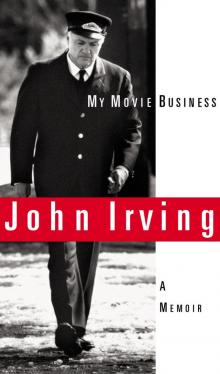 My Movie Business: A Memoir
My Movie Business: A Memoir In One Person
In One Person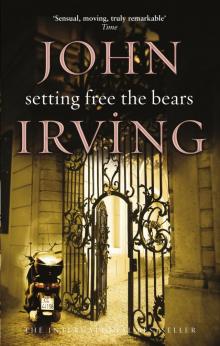 Setting Free the Bears
Setting Free the Bears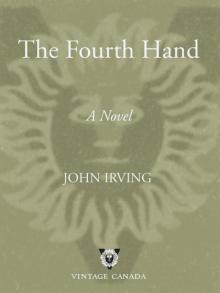 The Fourth Hand
The Fourth Hand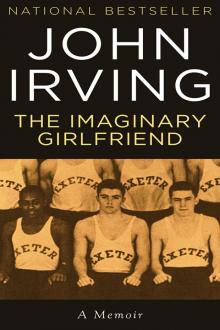 The Imaginary Girlfriend
The Imaginary Girlfriend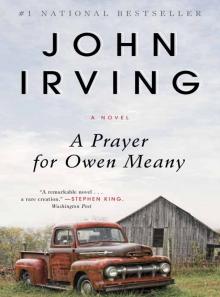 A Prayer for Owen Meany
A Prayer for Owen Meany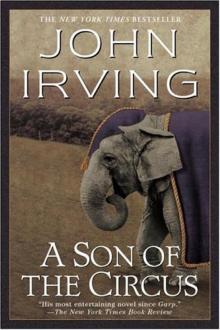 A Son of the Circus
A Son of the Circus Last Night in Twisted River
Last Night in Twisted River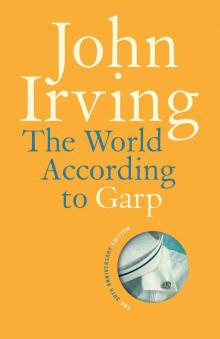 The World According to Garp
The World According to Garp The Cider House Rules
The Cider House Rules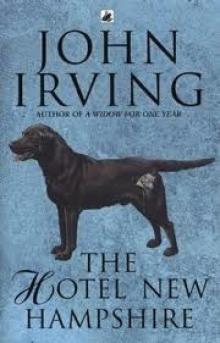 The Hotel New Hampshire
The Hotel New Hampshire The 158-Pound Marriage
The 158-Pound Marriage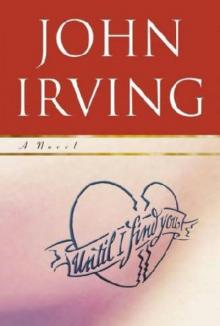 Until I Find You
Until I Find You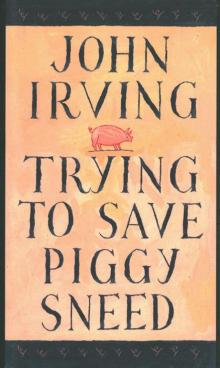 Trying to Save Piggy Sneed
Trying to Save Piggy Sneed Cider House Rules
Cider House Rules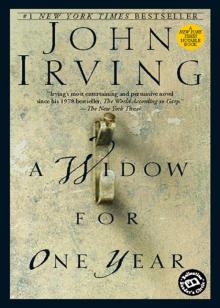 A Widow for One Year
A Widow for One Year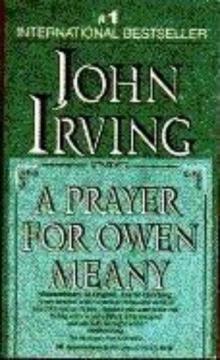 A prayer for Owen Meany: a novel
A prayer for Owen Meany: a novel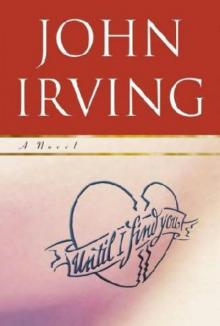 (2005) Until I Find You
(2005) Until I Find You